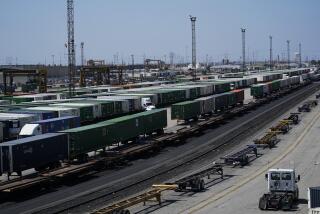Del Mar OKs Noise Limits, Suit to Stop Auto Races
- Share via
DEL MAR — Stiff noise-control regulations and a suit challenging the noise effects of Grand Prix auto racing were approved by the City Council Monday night, the latest moves in a cat-and-mouse game to prevent Grand Prix auto racing at the Del Mar Fairgrounds.
The noise ordinance, a carbon copy of San Diego County regulations, would limit noise levels in the city’s residential areas to about half the level of sound estimated to emanate from the high-powered sports cars that will participate in three days of time trials and racing during the 6-day event.
In a closed session Monday night, the council voted to challenge in court the environmental impact report that the Del Mar Fairboard commissioned to prove that noise and traffic congestion created by the racing event could be mitigated. Council members also allocated $15,000 to finance the legal challenge.
A state Agricultural Department official said Monday that the state-owned fairgrounds is exempt from local regulation, even though the property lies within the Del Mar city limits.
But George Gomes, chief deputy director of the state Department of Food and Agriculture, qualified his stand by explaining that “state facilities try to be good neighbors, and defying local laws does not serve the interests of the people.”
Del Mar city ordinances previously provided that noise must be kept within reasonable limits, but did not define what those limits were. Under the new city regulations, noise levels are limited to 50 decibels in low-density residential neighborhoods surrounding the race track and 55 decibels in higher-density residential areas.
A provision in the county ordinance prohibits “any disturbing or raucous noises caused off streets or highways by racing or accelerating the engine of any motor vehicle . . .. “
Gomes said that noisy events on state-owned properties have caused problems throughout California, “and because the state facilities exist for the benefit of the local communities,” local officials usually are consulted in reaching a compromise to noise problems. “It is sometimes difficult to reach a resolution, to convince local residents that measures can be taken to control the noise from such events,” such as limiting the volume of the public address system or requiring mufflers on racing cars, Gomes.
Despite threats of lawsuits from homeowners and civic officials in Del Mar and Solana Beach, Del Mar Fair Board officials last month approved a five-year lease with race operator Christopher Pook to allow the 10-day fall event, with six days of auto racing. At least one group, Citizens Against Noise, already has filed suit in an attempt to have the racing agreement voided.
Local property owners contend that the racing event will create a major nuisance as cars without mufflers scream around a curving track in the San Dieguito River valley, reverberating off nearby hillsides.
Roger Krauel, Del Mar city attorney, contends that the city has the right to enforce its regulations on the state-owned property within city limits.
Fair manager Roger Vitaich said that he had not yet received a ruling on the noise-enforcement issue from the state attorney general.
In Sacramento, Ray Malerbi, an events manager of state-owned fairgrounds, said fair officials are required to conform with county health and safety laws in conducting events such as motorcycle racing and rock concerts. Malerbi said Sacramento County noise ordinances are enforced by local government inspectors during all “motor events” held at the county fairgrounds.
More to Read
Sign up for Essential California
The most important California stories and recommendations in your inbox every morning.
You may occasionally receive promotional content from the Los Angeles Times.













